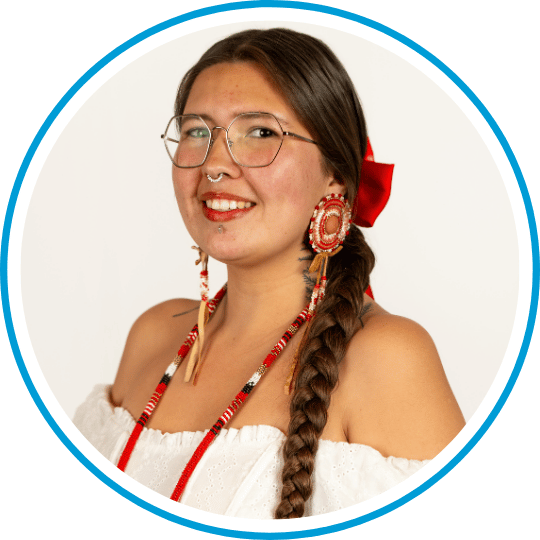Loretta Jeff-Combs
Loretta Jeff-Combs, a Tsilhqot’in youth leader from Tlesqox First Nation in British Columbia, Canada, is a passionate advocate for digital equity in Indigenous communities. She champions broadband infrastructure, Indigenous data sovereignty, and safe digital access for Indigenous women and girls. Her lived experience, as a student, young mother, and Indigenous woman, inspires her mission to ensure future generations thrive in the digital world while staying connected to their culture and traditions.

What does your work focus on?
My work focuses on addressing the digital divide in Indigenous communities, particularly in my home, the Tsilhqot’in Nation, by advocating for broadband infrastructure development and Indigenous data sovereignty. Reliable internet access is essential for education, healthcare, economic development, and cultural preservation. But many Indigenous communities in British Columbia remain without adequate broadband access, exacerbating existing inequalities and limiting opportunities.
I’ve done policy work with the LEVEL Youth Policy Program and developed a recommendation that highlights the urgent need for Indigenous-led broadband expansion. My proposal advocates for sustainable, community-driven infrastructure that ensures Indigenous communities have control over their digital futures. I also participated in Indigenous Connectivity Summits with the Indigenous Connectivity Institute, where I learned best practices in broadband development and digital governance. My goal is to bring this knowledge back to my nation and implement long-term solutions that empower Indigenous communities to manage their own networks.
Indigenous women and girls face many challenges in accessing and navigating digital spaces, lacking reliable internet access, digital literacy training, and safe online environments. My work aims to ensure they are included in digital policy conversations and have the tools needed to thrive in the digital world. I’m advocating for broadband expansion that prioritizes Indigenous women’s safety online, including digital literacy training and cybersecurity awareness. As an Indigenous woman, a youth, and a young mom to a daughter, I bring a gender and cultural lens to digital equity discussions.
What is the impact and scalability?
The impact of my project extends across education, healthcare, economic development, cultural preservation, and gender equity. By advocating for Indigenous-led, community-controlled broadband networks, my work ensures that Indigenous communities have the tools to participate in the digital economy, access essential services, and preserve their languages and traditions online.
One of the immediate impacts of my project is raising awareness about the critical need for broadband infrastructure in rural and remote Indigenous communities. Many decision-makers do not understand the depth of the digital divide Indigenous people face. My policy work and advocacy bring these issues to national and international discussions, ensuring Indigenous digital equity is prioritized in policy development.
By collaborating with organizations like the Indigenous Connectivity Institute and LEVEL, I contribute to solutions that go beyond just connectivity. My work ensures broadband expansion also addresses data sovereignty, digital safety, and cybersecurity, which are often overlooked in mainstream broadband policies.
Improved internet access enables Indigenous communities to use telehealth services, reducing barriers to medical care and mental health support. For education, it allows Indigenous students, especially young women, to access online learning while staying in their communities, fostering a balance between higher education and cultural immersion. My work directly supports Indigenous women and girls by ensuring they have a safe and inclusive digital space.

What does being selected as an ITU160 Gender Champion mean to you, and how will you use this platform?
Loretta Jeff Combs sets’edinh, Tsilhqot’in Deni nesdlin, Tlesqox belh Tletinqox desni. I want to be an ITU160 Gender Champion because I am deeply committed to bridging the digital divide in Indigenous communities and ensuring that Indigenous women and girls have safe, equitable access to digital opportunities.
As a high school student, then a post-secondary student, always having to leave my home and my language and culture for western education, and now as a mom facing those same struggles with little virtual healthcare for my family, I have firsthand experience of the challenges that come with limited broadband infrastructure. My work in digital development, policy advocacy, and Indigenous data sovereignty has reinforced the urgent need for Indigenous voices, especially women’s, in the tech and digital policy spaces.
As an Indigenous woman working in digital development, I bring a unique and necessary perspective. This opportunity would strengthen my advocacy, amplify Indigenous voices in global tech discussions, and help shape a digital future that is inclusive, equitable, and culturally empowering for all.
I want to help pave the way for more Indigenous women and girls to access, shape, and lead in the digital world. I want to help my daughter and future generations thrive in the digital world while also staying connected to their culture, language, and traditions. Sechanalyagh.